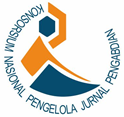Pelatihan Pemanfaatan dan Pengembangan Bahan Ajar Digital Berbasis Multimedia Interaktif untuk Menghadapi Era Revolusi Industri 4.0
Abstract
Kegiatan diperuntukkan guru-guru SMP di desa Turirejo Kec Lawang, dengan tujuan utama desa ini dapat menjadi pilot project dimana nantinya program pengabdian ini dapat berlanjut di beberapa desa di kecamatan yang lain. Era revolusi industri 4.0 telah membawa banyak perubahan pada berbagai aspek kehidupan dimana teknologi memiliki peranan yang sangat besar dan menjadi motor utama perubahan di setiap aspek. Guru idealnya memiliki kemampuan untuk mengembangkan bahan ajar dan media pembelajaran yang dapat diakses melalui perangkat digital, serta mampu memanfaatkan sumber-sumber belajar lain yang sesuai dengan karakteristik digital native. Hasil kegiatan telah dapat meningkatkan kapabilitas para guru dalam memanfaatkan dan mengembangkan bahan ajar digital berbasis multimedia interaktif, hal ini berdampak pada proses pembelajaran yang menjadi semakin variatif.
Kata kunci— bahan ajar digital, literasi digital, multimedia interaktif, pelatihan, revolusi industry 4.0.
Abstract
The activity is aimed at junior high school teachers in Turirejo village, Lawang district, with the main objective of this village being a pilot project where this community service program is needed to be continued in several villages in other sub-districts. The era of the industrial revolution 4.0 has brought many changes to various aspects of life while technology has a very big role and is the main motor of change in every aspect. The teacher ideally has the ability to develop teaching materials and learning media that can be accessed through digital devices, and be able to use other learning resources that are compatible with the original digital characteristics. The results of the activities have improved the ability of teachers to develop and develop interactive multimedia-based digital teaching materials, this has improved the learning process which has become increasingly varied.
Keywords— digital teaching materials, digital literacy, interactive multimedia, training, industrial revolution 4.0
Full Text:
PDFReferences
Akcayir, M., Hakan Dündar, Gökçe Akçayır. (2016). What makes you a digital native? Is it enough to be born after 1980? Computers in Human Behavior, 60 (July), pp. 435-440
Erenli, K. (2012). The impact of gamification: a recommendation of scenarios for education. In 15th International Conference on Interactive Collaborative Learning (ICL), 26–28 Sept. 2012 (pp. 1–8).
Grivokostopoulou F., Perikos, I., & Hatzilygeroudis, I. (2016). "An Innovative Educational Environment Based on Virtual Reality and Gamification for Learning Search Algorithms," 2016 IEEE Eighth International Conference on Technology for Education (T4E), Mumbai, India, 2016, pp. 110-115.
Mardina, R. (2011). Potensi Digital Natives dalam Representasi Literasi Informasi Multimedia Berbasis Web di Perguruan Tinggi. Jurnal Pustakawan Indonesian, 11(1), 5-14
Moreno, J. (2012). Digital competition game to improve programming skills. Educ Technol Soc 15(3), 288–297 (2012)
Muntean, C. I. (2011). Raising engagement in e-learning through gamification. In 6th International Conference on Virtual Learning ICVL (pp. 323–329)
Ng, W. (2012). Can we teach digital natives digital literacy? Computers and Education, 59(3), 1065-1078. doi:10.1016/j.compedu.2012.04.016
Prastiti, S. D., & Sri Pujiningsih. (2009). Pengaruh Faktor Preferensi Gaya Belajar terhadap Prestasi Belajar Mahasiswa Akuntansi. Jurnal Ekonomi Bisnis, 14(3), 224-231
Prensky,M. (2001). Digital natives, digital immigrants part 1, On the horizon, 9 (5), pp. 1-6
Rachmad, A. N. (2015). Perilaku Konsumsi Surat Kabar pada Digital Native (Studi Deskriptif Perilaku Konsumsi Surat Kabar pada Remaja Usia 14-21 Tahun di Yogyakarta). Skripsi, Yogyakarta: Universitas Gadjah Mada
Rahadi, D.R., & Zainal. (2015). Perilaku Pengguna Smartphone di Kalangan Mahasiswa Kota Palembang. Annual Research Seminar (ARS) Fakultas Ilmu Komputer UNSRI, hlm. 161-166.
Teo, T. (2013). An initial development and validation of a Digital Natives Assessment Scale (DNAS) Computers & Education 67, pp. 51–57
Yong, S., & Gates, P. (2014). Born digital: Are they really digital natives? International Journal of e-Education, eBusiness, e-Management and e-Learning, 4(2), 102-n/a. doi:http://dx.doi.org/10.7763/IJEEEE.2014.V4.311
DOI: http://dx.doi.org/10.17977/um045v3i1p53-57
Refbacks
- There are currently no refbacks.
Email: karinov@um.ac.id

This work is licensed under a Creative Commons Attribution-ShareAlike 4.0 International License.






